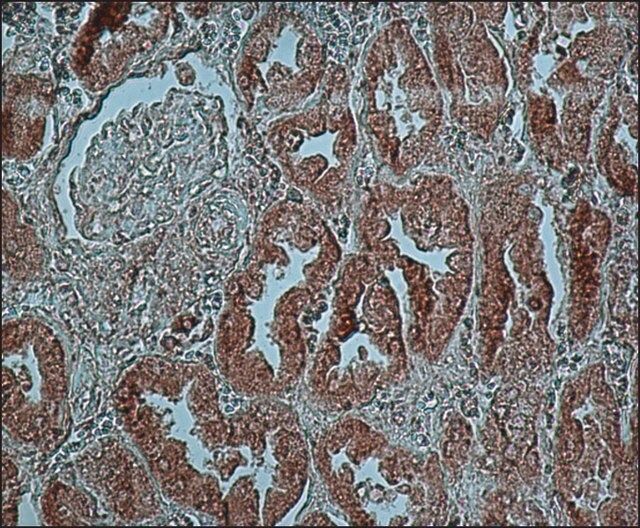您的位置:首页 > 产品中心 > Anti-Glycoprotein (MDR) antibody, Mouse monoclonal
Anti-Glycoprotein (MDR) antibody, Mouse monoclonal

| 产品编号: | 4108236 |
| 规格: | clone F4, purified from hybridoma cell culture |
| 包装规格: | 100 μL |
| 产品类别: | 进口试剂 |
| 品牌: | Sigma-Aldrich |
| 优惠价: | 立即咨询 |
产品别名
Anti-Glycoprotein (MDR) antibody, Mouse monoclonal
ATP-binding cassette sub-family B member 1
ABCB1
Multidrug resistance protein 1
P-glycoprotein 1
基本信息
| NACRES | NA.41 |
| General description【一般描述】 | Anti-P-Glycoprotein (MDR) antibody, mouse monoclonal (mouse IgG1 isotype) is derived from the hybridoma F4 produced by the fusion of mouse myeloma cells and splenocytes from BALB/c mice. Multidrug resistance protein 1 (MDR1) is a member of the adenosine triphosphate (ATP)-binding cassette (ABC) transporters superfamily. It is ubiquitously expressed in kidneys, intestines, placenta, liver, adrenal glands blood-brain barrier (BBB), placenta and testis. |
| Specificity【特异性】 | Anti-P-Glycoprotein (MDR) antibody, Mouse monoclonal recognizes an epitope located at the N-terminal region of P-glycoprotein (Pgp), at the third extracellular loop of the molecule, also known as ABCB1 protein. The antibody specifically detects MDR1 P-glycoprotein, but does not recognize MDR3. Anti-P-Glycoprotein (MDR) cross reacts with MDR1 P-glycoprotein from human and hamster origin. |
| Immunogen【免疫原】 | a mixture of human and hamster drug-resistant whole cells and crude plasma membranes. |
| Application【应用】 | Anti-Glycoprotein (MDR) antibody, mouse monoclonal may be used in:
|
| Biochem/physiol Actions【生化/生理作用】 | Multidrug resistance protein 1 (MDR1) functions as an adenosine triphosphate (ATP)-dependent efflux pump. It is also involved in extruding certain xenobiotics and protect cells from toxicants. MDR1 gene is overexpressed in different cancer types including leukemias, lymphomas, myelomas, breast cancer, ovarian cancer, gastrointestinal stromal tumor (GIST), non-small cell lung cancer (NSCLC), fallopian tube, colon, renal, and thyroid cancers. Overexpression of MDR1 gene plays an important role in prompting multidrug resistance in cancer chemotherapy causing high resistance of cancerous cells to a wide variety of substrate anticancer drugs. |
| Physical form【外形】 | Solution in 0.01 M phosphate buffered saline, pH 7.4, containing 15 mM sodium azide. |
产品性质
| Quality Level【质量水平】 | 200 |
| biological source【生物来源】 | mouse |
| antibody form【抗体形式】 | purified from hybridoma cell culture |
| antibody product type | primary antibodies |
| clone【克隆】 | F4, monoclonal |
| form【形式】 | buffered aqueous solution |
| species reactivity | human, hamster |
| concentration【浓度】 | ~1 mg/mL |
| technique(s) | flow cytometry: suitable immunoblotting: suitable immunocytochemistry: suitable immunohistochemistry: suitable immunoprecipitation (IP): suitable |
| isotype【同位素/亚型】 | IgG1 |
| UniProt accession no.【UniProt登记号】 | P08183 |
| shipped in【运输】 | dry ice |
| storage temp.【储存温度】 | −20℃ |
产品说明
| Storage and Stability【储存及稳定性】 | For continuous use, store at 2–8 ℃ for up to one month. For extended storage, freeze in working aliquots. Repeated freezing and thawing is not recommended. If slight turbidity occurs upon prolonged storage, clarify the solution by centrifugation before use. Working dilution samples should be discarded if not used within 12 hours. |
| Disclaimer【免责声明】 | Unless otherwise stated in our catalog, our products are intended for research use only and are not to be used for any other purpose, which includes but is not limited to, unauthorized commercial uses, in vitro diagnostic uses, ex vivo or in vivo therapeutic uses or any type of consumption or application to humans or animals. |
安全信息
| Storage Class Code【储存分类代码】 | 12 - Non Combustible Liquids |




